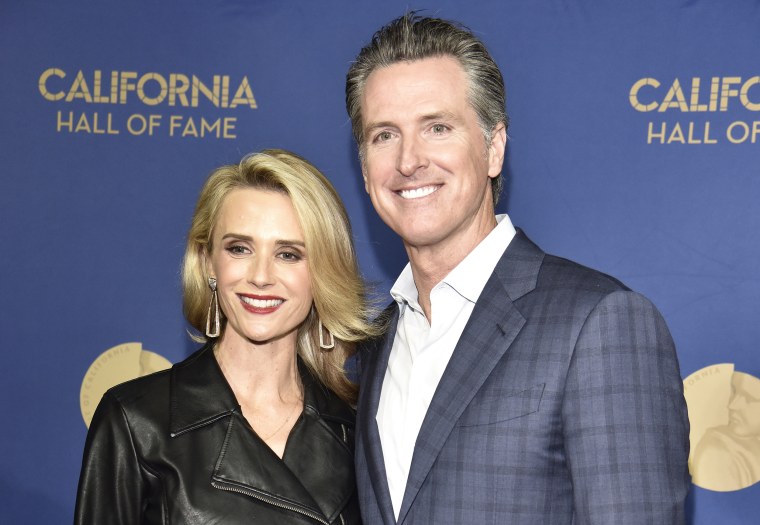In a political climate already divided by bitterness and noise, California’s First Partner, Jennifer Siebel Newsom, just dropped a verbal bombshell that has Washington — and much of the nation — on edge. In a fiery statement that spread across social media within minutes, the wife of California Governor Gavin Newsom declared:
“I will not raise my children to think Trump is an acceptable leader. He’s a con artist, a predator, a malignant narcissist. And the worst president in our nation’s history.”
Those words, sharp as glass and impossible to ignore, have ignited a storm of reaction across political lines. Within hours, hashtags like #JenniferNewsom, #TrumpResponse, and #LeadershipMatters were trending nationwide.
For Democrats, her comments are a rallying cry — a defiant rejection of what they see as the erosion of decency in public life. For Trump supporters, they’re an unforgivable insult — proof, they say, of “California elitism” and the “Hollywood mindset” taking over American politics.
But beyond the noise, Jennifer Newsom’s statement marks something bigger: the transformation of political spouses from background supporters into front-line cultural figures shaping the national conversation.

A Woman With Her Own Power
Jennifer Siebel Newsom is not just a governor’s wife. She’s a filmmaker, activist, and founder of The Representation Project, a nonprofit organization fighting gender stereotypes and promoting equality in media. Long before Gavin Newsom was in the governor’s mansion, Jennifer was documenting how culture shapes behavior — particularly the way society defines masculinity, power, and leadership.
Her 2011 documentary Miss Representation explored how media portrayals of women limit female potential. Later, her 2015 follow-up The Mask You Live In examined the emotional damage caused by narrow definitions of manhood.
Her latest comments, then, weren’t random. They came from someone who’s spent years studying — and publicly challenging — how men in power wield influence.
When she called Donald Trump a “malignant narcissist,” she wasn’t just name-calling. She was diagnosing, in her words, “the kind of leadership that glorifies domination over empathy — and calls it strength.”
The Moment That Sparked It
According to multiple reports, the remark was made during a panel discussion in Los Angeles about women in leadership and the future of democracy. The event, hosted by The Representation Project, featured business leaders, educators, and activists. But when the topic shifted to 2024’s political climate, Jennifer Newsom didn’t hold back.
Those in the room describe the atmosphere as electric — some gasping, others erupting in applause. One attendee, speaking anonymously, said:
“You could feel it — the exhaustion with politics, the hunger for honesty. Jennifer didn’t say what was ‘safe.’ She said what everyone was thinking but too afraid to say.”
Moments later, clips of her speech went viral online. Within hours, major news outlets picked up the story, while conservative commentators launched their own counterfire.
The Trump Camp Responds
It didn’t take long for allies of former President Trump to hit back.
Donald Trump Jr. called her comments “elitist garbage from people who think America is beneath them.” On Truth Social, Trump himself reportedly wrote:
“Jennifer Newsom should worry more about her husband’s failing state than about me. California’s collapsing — crime, drugs, and homelessness. Sad!”
The statement, predictably, only fueled the debate. Trump supporters began circulating old clips of Jennifer and Gavin Newsom at Hollywood fundraisers, calling them “out of touch” and accusing her of “performative activism.”
But others see the moment differently — as a sign that women in political spaces are no longer willing to stay silent or play “decorative” roles.
A Line in the Sand for Mothers in Politics
Political strategists say Jennifer’s comment resonates deeply with one group: mothers.
“She spoke like a mom, not a politician,” said Dr. Lila Morrison, a political communication analyst at Georgetown University. “Her words weren’t about policy — they were about what kind of example we set for our kids. That’s powerful, especially in a time when Americans are asking who we’ve become.”
Indeed, Jennifer’s most striking line — “I will not raise my children to think Trump is an acceptable leader” — has already been quoted thousands of times, turned into TikTok soundbites, and printed on protest signs.
It echoes the frustration of many parents who feel their values are being tested in a political era defined by anger and division.

The Broader Implication — and the Backlash
But her bold stance also reignites a long-standing debate: should political spouses — especially women — wade into partisan fights?
Critics argue her statement crosses a line. “She’s the First Partner of California, not a campaign surrogate,” said conservative columnist Ben Hoffman. “When she uses the state platform to attack a former president, it’s not activism — it’s politics, plain and simple.”
Supporters disagree. “Jennifer Newsom isn’t afraid of power — and that scares people,” tweeted MSNBC commentator Joy Reid. “She’s saying what millions of Americans already know: character does matter.”
It’s a clash between two visions of leadership — one rooted in diplomacy and restraint, the other in emotion and authenticity.
Gavin Newsom’s Silence — Strategic or Supportive?
Governor Gavin Newsom, often rumored to harbor national ambitions himself, has remained notably silent on his wife’s comments. His office released a brief statement saying only:
“Jennifer Siebel Newsom is an independent advocate with her own views and voice.”
Those 15 words may say more than they appear. Analysts believe the governor is walking a fine line — balancing his role as a Democratic leader while giving his wife room to speak freely. It’s a modern political dilemma: how to support a partner’s convictions without letting them define your political narrative.
Still, insiders say the Newsoms are unified in private. “They’re a team,” one longtime family friend told The Sacramento Bee. “He’s not telling her what to say — and she’s not asking for permission.”
:max_bytes(150000):strip_icc():focal(999x0:1001x2)/gavin-newsom-jennifer-siebel-newsom-10-60b0fe474bb84bfbbce48cea374d6a45.jpg)
The Moment That Could Redefine the Conversation
Love her or hate her, Jennifer Newsom has forced America to confront an uncomfortable question: what do we really expect from those who lead us — and those who raise the next generation to follow?
Her words are being replayed across cable news and social media, dissected by pundits, meme-makers, and political opponents alike. Yet beneath the chaos, one truth remains clear: her message struck a nerve.
For years, America’s political debates have centered on policy and party lines. But Jennifer Newsom’s outburst touched something deeper — the moral fiber of leadership itself.
“We teach our children how to see the world,” she said near the end of her talk. “If we normalize cruelty, we raise cruelty. If we normalize compassion, we raise courage.”
In an era of spin, scandal, and social media rage, that sentiment has cut through the noise.
And whether you agree with Jennifer Newsom or not, one thing is undeniable — she just made sure the conversation about leadership, decency, and America’s future is louder than ever.





